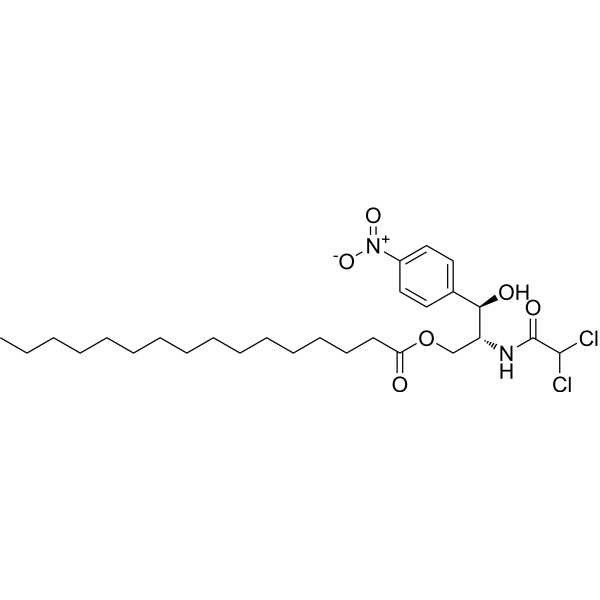All AbMole products are for research use only, cannot be used for human consumption.

For this product's availability, delivery time and price, please email [email protected] directly or click the "Inquiry Now" button below.
Chloramphenicol palmitate is an orally active broad spectrum antibiotic and has a broad spectrum of activity against gram positive and gram negative bacteria. Chloramphenicol palmitate inhibits bacterial protein synthesis by blocking the peptidyl transferase step. Chloramphenicol palmitate can be used as bacterial selection agent in transformed cells containing chloramphenicol resistance genes.
| Molecular Weight | 561.54 |
| Formula | C27H42Cl2N2O6 |
| CAS Number | 530-43-8 |
| Form | Solid |
| Solubility (25°C) | DMSO 100 mg/mL (ultrasonic) |
| Storage |
Powder -20°C 3 years ; 4°C 2 years In solvent -80°C 6 months ; -20°C 1 month |
[3] D A Powell, et al. Drug Intell Clin Pharm. Chloramphenicol: new perspectives on an old drug
[4] S Shankaran, et al. J Pediatr. Use of chloramphenicol palmitate in neonates
| Related Antibiotic Products |
|---|
| Puromycin-d3
Puromycin-d3 is the deuterium labeled Puromycin. Puromycin dihydrochloride is the dihydrochloride salt of puromycin. Puromycin is an aminoglycoside antibiotic that inhibits protein synthesis. |
| BSH-IN-1
BSH-IN-1 is a potent and covalent inhibitor of gut bacterial recombinant bile salt hydrolases (BSHs) with IC50s of 108 nM and 427 nM for B. longum BSH (Gram positive) and B. theta BSH (Gram negative), respectively. |
| AAA-10
AAA-10 is an orally active gut bacterial bile salt hydrolases (BSH) inhibitor, with IC50s of 10 nM, 80 nM against B. theta rBSH and B. longum rBSH respectively. |
| Gut restricted-7
Gut restricted-7 (GR-7) is a potent, covalent and orally active pan-bile salt hydrolase (BSH) inhibitor. Gut restricted-7 has a tissue-selective and is restricted to the gut. Gut restricted-7 decreases gut bacterial BSHs and decreases deconjugated bile acid levels in feces of mice. |
| N-Hydroxypipecolic acid
N-Hydroxypipecolic acid (1-Hydroxy-2-piperidinecarboxylic acid), a plant metabolite and a systemic acquired resistance (SAR) regulator, orchestrates SAR establishment in concert with the immune signal salicylic acid. N-Hydroxypipecolic acid accumulates systemically in the plant foliage in response to pathogen attack. N-Hydroxypipecolic acid induces SAR to bacterial and oomycete infection. |
All AbMole products are for research use only, cannot be used for human consumption or veterinary use. We do not provide products or services to individuals. Please comply with the intended use and do not use AbMole products for any other purpose.


Products are for research use only. Not for human use. We do not sell to patients.
© Copyright 2010-2024 AbMole BioScience. All Rights Reserved.
